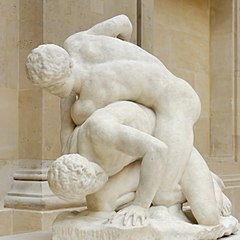Does God have Needs?
A clear understanding of God’s impassibility must be maintained when considering the accuracy of any doctrinal formulation. This is to say that any doctrine that presents God as having a need, is clearly flawed. God does not need anything! He has never had a need to have His honor restored, His justice satisfied, or any other thing. God is and always has been fully satisfied from all eternity.
A needy God is no God at all, and yet, since the beginning of the 2nd millennium, the western expression of Christianity has not been consistent in applying their understanding of the impassibility of God to their doctrinal formulations. This forgetfulness of God’s impassibility first lays hold of western theology in the writings of Anselm, the Bishop of Canterbury. In his influential book, Cur De Homo, Anselm addresses the disorder in the universe, and posits that universal disorder exists because humanity owes God a debt of honor.
"This is the debt (the guilt of sin) which man and angel owe to God, and no one who pays this debt commits sin; but every one who does not pay it sins. This is justice, or uprightness of will, which makes a being just or upright in heart, that is, in will; and this is the sole and complete debt of honor which we owe to God, and which God requires of us.”
Anselm plants a new seed into the mind of the church, and the new thought is that God, the one previously thought to be immovable by mankind’s actions, has in fact been moved to need something from His creatures by their actions.
In Anselm's view, God needs His honor restored because the harmony of the universe, what he calls “the order of things”—in rerum ordine, has been ruined by mankind. In his view, the only possible way of restoring universal harmony is by repaying the debt of honor owed to God. This debt moreover, was of so infinite that it required a being of infinite greatness, such as the Second person of the trinity, acting as a man on behalf of men, to repay the debt of honor owed to God the Father. In this view, God’s bliss, and therefore universal order would be recovered only by the satisfaction of God the Father’s honor. Anselm’s theory presents us with a God that is passible and mutable. In short, if Anselm is correct, then God suffers change and He is moved from His state of perfection and bliss by his creatures.
Moreover, Anselm's theory sees God not only as passible, but also as being divided and even Schizophrenic within His one trinitarian essence. In His theory, God the Father is the offended person within the Trinity, and the only person that needs to have his honor satisfied.
The satisfier in this theory is the second person of the trinity, the Logos, and He is assisted in doing the satisfying by the third person the trinity, the Holy Spirit. Thus, one person in the trinity needs satisfaction, but the rest apparently have no need for that same satisfaction, because they are the satisfiers. These two problems are a philosophical death blow to Anselm’s theory, and to any doctrines built upon his theory. Anselm’s view reveals a massive ontological misunderstanding and cannot possibly be correct. It is the error of the millennium, and a major distortion of Christian theology.
How Did the Distortions Unfold?
The West’s relinquishment of clarity with regards the impassibility of God, resulted in the reshaping of their historic understanding of the Christian impassable God to that of a paganesque demiurge. More specifically, This new God was great and powerful, able to create, and capable of great goodness, but He also had needs, and was capable of great meanness in order to satisfy his needs. When analyzed closely, this new God has many similarities to the former pagan gods with a little “g”. Like all of the Greek and Roman gods that had been part of the culture before, Anselm’s god was subject to emotions and change, and was able to be moved by actions of his creatures.
This seemingly unnoticed shift from impassibility to passibility, from God to demiurge, opened the doors to former pagan ways of thinking about Christian doctrines. Almost immediately after Anselm, the West began a massive revision of Christian doctrine. First was the the invention of original sin, which is the teaching that the passing of Adam’s guilt occurs by birth, making everyone an offense to God. This shift from what was previously understood as a change in man, the inheritance of Adam’s condition of corruption and mortality, morphed into a legal debt which needed to be satisfied because God was affected by man’s action.
In short, Man’s problem became God’s problem. Then followed the doctrines which really caused this new passible God to change: the planks of salvation, the treasury of merit, purgatory, and dispensations for sin, all four of which depend on a celestial bank account full of merit that could be transferred around with donations and the saying of certain prayers in order to satisfy the dishonored God. What occurred was the general transformation of the Christian God from a being who is immovable “love,” to a being whois right from the beginning of our lives “anger,” and who created death and hell for the satisfaction of His justice against those who offended Him. Every one of these distortions is connected to the new passible God, the demiurge of Anselm.
After 500 years of this demiurge, the people became disenchanted with this new, angry, celestial banker of a God who sought appeasement at every turn. Consequently, when the Protestant reformation appeared, it swept through western Europe like fire over dry brush. Unfortunately, the reformers did not return to the view of God that was present before Anselm, instead, they retained Anselm's theory of a passible God. The one doctrine they unanimously preserved was the view that God needed His honor satisfied.
“Christ, by His obedience and death, did fully discharge the debt of all those that are thus justified, and did make a proper, real and full satisfaction to His Father's justice in their behalf…” (WCF 11. 3)
The Westminster Confession, like Anselm, affirms that God needs to have a debt owed Him satisfied, and He is capable of being moved by beings outside of Himself, meaning that He is a contingent being, a god or demiurge rather than God. It is this passible, angry God, in need of satisfaction was preserved by the reformers. More importantly, this passible God remains the being to whom the west looks at when they call on God.
What Does An Angry God Produce?
The western expression of Christianity as has been discussed above is therefore a mixed bag. On the one side God is spoken of as immutable, good, and perfect, while on the other side God is said to have needs and emotions brought about by His creatures.
In the typical folk expressions of western Christianity, it is common to hear quotes from scripture such as, “God is angry with the wicked every day” (Ps 7:11), or “vengeance is mine, I will repay” (Dt 32:35). In the common understanding, the point being made by those who quote these verses is that God is moved by the actions of persons who act wickedly, In other words, He responds to His emotions caused by outside beings. The result of this presentation is that God is nothing more than a big human, who behaves perfectly, and who rains down pain on all who cannot attain to that perfection. In this kind of Christianity, God’s impassibility is treated as a kind of theoretical nicety, but not as a necessity for the understanding of God, much less what is meant by these words being quoted.
The humble and faithful Western Christian who has truly encountered the God of Christians has also by the mere encounter learned of the immense love of God, and for this reason is for the most part willing to accept what to them appears to be a God that can be moved to anger. However, those with a less docile mind and heart, and those hardened by their own corruption rebel furiously, and in a sense who can blame them? Consequently, as a result, there has been a severe backlash in the West, this angry God produced angry people, and a population who wants no God at all rather than one who takes pleasure in both the temporal and eternal torture of His creatures. All we need to do is tally up the decreasing number of active Christians in western Europe and North America in order to confirm this. Ask the average non Christian in these lands why they reject Christianity and the common answer will be, “who can, or even want to believe in such a God as that God?” In short, this angry God does not draw those who are darkened in their souls closer, rather he drives them further away.
How Does Understanding Impassibility Help?
The God that is understood in Light of His impassibility is not the same God as presented above, who is in fact a demiurge. In fact, He is the God who turned the world upside down in the person of Jesus Christ and by the power of His Holy Spirit.
This God is the fullness of perfection and love. He is the fullness of being, consciousness, and bliss. It is in the fullness of Him that we experience our own being, consciousness, and bliss. Every experience of beauty, every good, every mercy, kindness, and love is a participation in that God.
Moreover, the more we participate in these perfections the more we know God, and the more we are able to receive Him as light. The reason God took on flesh is precisely so that mankind might be able to freely enter into that new state of being. It is what the Eastern Church calls deification. God became man that we might become like him through willfully choosing to live in His light. God is Good all the time, and all the time God is good. There is never darkness, or evil, or anger emanating from God. The plain fact is that the rejectors are correct in denying a passible God, yet sadly, both they and the believers who blindly accept this kind of God miss the point being conveyed.
God is pure beauty, perfection, and light, and nothing opposed to that light will overcome it, but rather be overcome by that light. Like the Egyptians who pursued the Israelites, those who oppose God will not face a being with a bad mood, but rather the same being that has always been, light.
The problem for those who oppose God is that by their free choice of a life apart from His light, they will not be able to experience God as light, but only as a consuming fire. Not because any change occurs in God. He is love and goodness always, it is the dysfunctional and rejecting creature that cannot stand the light. To that creature the love of God is a consuming fire, a situation wherein there is gnashing of teeth (anger in the creature) and where the worm does not die (cease to be).
No blame for this outcome can in any way be placed upon God, only upon those who do not want any part of God and His goodness. This is what is meant by the scriptures when they say that “God desires that all be saved” (1 Ti 2:4), and “how often have I longed to gather your children together, as a hen gathers her chicks under her wings, and you were not willing” 9Lk 13:34).
In closing, I find it best to state that which the Orthodox church has embraced and taught for 2000 years:
“This is the message we have heard from him and declare to you: God is light; in him there is no darkness at all.” (1 Jn 1:5)




